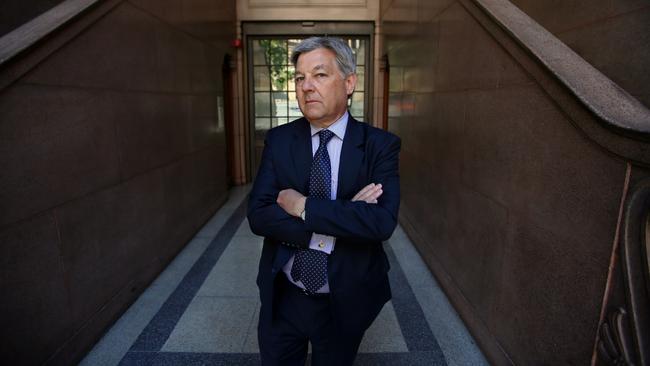Sheahan Lock Partners wants funded insolvency agency to chase billions in lost tax for ATO
An insolvency practice that went after the Binetter family’s Nudie Juice company wants the government to establish an agency to reclaim billions in unpaid tax due to businesses going insolvent.

An insolvency practice that went after the Binetter family’s Nudie Juice company has called on the federal government to establish a new agency to reclaim tens of billions of dollars uncollected by businesses going insolvent.
Sheahan Lock Partners, which secured one of the nation’s biggest recoveries of missing tax money of $200m from the founders of Nudie Juice, wants the government to unleash a wave of well-financed litigation against tax avoiders.
The call comes as insolvency rates have surged in recent months, with 9989 insolvency appointments in the 11 months to May 31, putting the nation on track for its highest number of insolvencies in a financial year since the Global Financial Crisis, according to the Australian Securities & Investments Commission.
Sheahan Lock has proposed the creation of a new agency called the Australian Impaired Asset Fund housed inside the Department of Finance that would use litigation funders to help finance the search for causes of action against those in business whose companies collapsed owing money to the tax office.
“There are many instances where significant recoveries from the crown go unidentified because there hasn’t been the money to fund proper investigations. Even if claims are identified, they may not be pursued because the liquidator is unfunded or they don’t want the risk of something that may take years,” Sheahan Lock partner John Sheahan said.
“The underperformance of collection activity by the ATO in the insolvency sector is striking when taking into account the powers afforded to liquidators under Australia’s corporations law regime.”
Under the scheme, suitably qualified independent practitioners could be seconded, hired or engaged by the fund to undertake the necessary review.
Increased insolvency rates coincide with not just deteriorating economic conditions but also as tax office steps up enforcement activities after winding them back during the pandemic. In May, insolvency appointments lifted 44 per cent from the year prior, to 1245 – the most ever recorded in a month.
Liquidations represented about 65 per cent of all insolvencies, compared to restructures at 25 per cent. Business Reset director and restructuring practitioner Jarvis Archer told The Australian most companies facing insolvency were being closed, and only one in four being rescued, because of renewed pressure from the ATO.
He added that businesses were being weighed down by increased living expenses because many had used ultra-cheap loans when their companies were making money in 2021 and 2022 to buy new cars, houses and equipment.
“That bubble has now burst and what these business owners weren’t prepared for is the difficulty arising when costs increased with inflation and interest rates, but revenue also dropped as a result,” Mr Archer said.
“As a result, post-Covid ATO debts are becoming more common, and directors are having to refinance their house to meet debts and ongoing expenses.”
The ATO is the largest unsecured creditor in Australia, with total collectable debt having doubled since 2019 to $50.2bn in the 2023 fiscal year. Small businesses continued to be overrepresented in the ATO’s debt book, owing more than $33bn of the $45bn of collectable debt owed by all businesses.
Sheahan Lock reclaimed $200m for the ATO after the successful pursuit of members of the Binetter family, founders of Nudie Juice. Before Sheahan Lock was appointed liquidator, another insolvency practice had concluded there were no assets in the family’s BCI that could be recovered.
After Sheahan Lock’s appointment, the firm found no financial assets in BCI. It spent $100,000 of its own money investigating the company’s other assets, which Mr Sheahan said was a hurdle for many practitioners and why the creation of a fund was vital to reclaiming lost tax.
“If replicated in only a handful of cases each year, the returns to the government would be very significant. As the uncollected tax written off each year continues to rise, identifying and realising such opportunities warrants close consideration,” Mr Sheahan said.
“Opportunities for making recoveries could be identified and proactively litigated by selected practitioners. It is expected that such a scheme would initially be internally funded from recoveries, with surplus funds being paid to consolidated revenue.”
Mr Sheahan said the skills required to undertake the assessment existed within the ranks of established, experienced insolvency professionals compared to the public service, and that the plan would be to go after significant debt and not half a million dollars owing here and there.
“By bringing the crown, which has huge debts, together with the commercial community to have these matters properly investigated and then to share in the upside: If the crown got 65 per cent of something, it’s a lot better than 100 per cent of nothing,” he said.

HLB Mann Judd partner and restructuring and insolvency specialist Todd Gammel said the involvement of the ATO around insolvent firms was important given many had not been operating sustainably for years.
“The ATO has more of a responsibility now to focus on the bad actors and remove repeat offenders from the market,” he said.
“There probably are a lot of businesses that need to be washed out of the economy, such as start-ups, where people piled into them when the cash rate was near zero but haven’t been able to mature enough to reach profitability.”
Leading financial solutions company OptiPay has seen a record level of inquiry this month as companies struggle under the weight of unpaid Covid tax debt, high inflation and the increasing cost of doing business.
OptiPay chief executive Angus Sedgwick said businesses needed to make plans and take actions to address cashflow issues before creditors such as the ATO or suppliers take recovery action.
“If the ATO or suppliers have lodged tax or payment defaults on the business with credit reporting agencies it will make it very difficult to obtain finance,” he said.






To join the conversation, please log in. Don't have an account? Register
Join the conversation, you are commenting as Logout